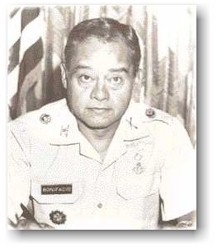|
Retired Col. Robert A.
Bonifacio is honored for
exceptional contributions to
operational testing during the
period of February 1976 through
March 1982.
Upon approval by the Department
of Army for activation of a
totally independent aviation
operational test organization,
Bonifacio was selected
as the first Army Aviation Test
Board President/Commander.
Unlike the other Training and
Doctrine Command's Operational
Test Boards, which were
transferred intact from the Test
and Evaluation Command, the
Aviation Test Board was created
from scratch.
Between his selection in
February and the Board's
activation on 1 July 1976, he
successfully met the challenge
of developing a Table of
Distribution and Allowances,
obtaining test and
administrative facilities, and
establishing procedures to
implement new operational
testing regulations.
During his tenure, he was
directly responsible for the
planning, execution, and
reporting of 86 programmed user
tests.
Major acquisition programs
effectively supported with
tests, studies, and evaluations
included the UH-60 Black Hawk
Helicopter, Light Combat
Helicopter (LCH), UH-60
Simulator, and virtually all of
the Aircraft Survivability
Equipment currently utilized on
Army aircraft.
The Army's Longbow Apache and
Comanche Helicopter programs'
roots can be directly traced
back to the Light Combat
Helicopter test efforts.
Bonifacio recognized that there
was a wealth of Army aviation
noncommissioned officers (NCOs)
with the capability of
performing at test officers.
In 1979,
Bonifacio
initiated a program to recruit
and train aviation
NCOs
as test officers. His personal
efforts resulted in the
successful planning and
execution of an operational test
by an NCO in 1980. A standard
was set which has been carried
on to present-day operational
testing with NCOs conducting
tests around the world.
The positive effects of Bonifacio's demand for thorough
and innovative operational
testing continue to impact Army
aviation, and will influence the
Army into the twenty-first
century.
|

